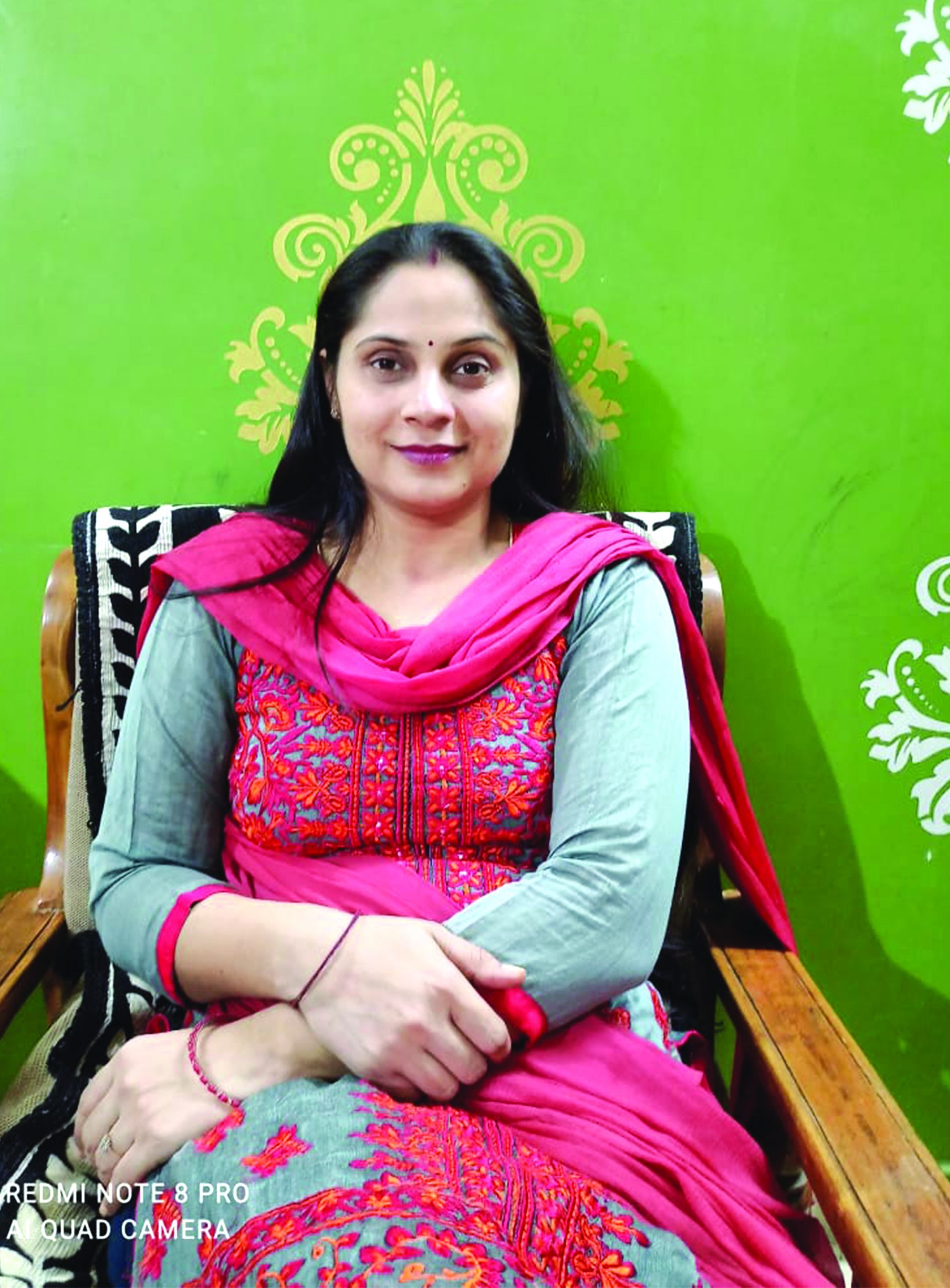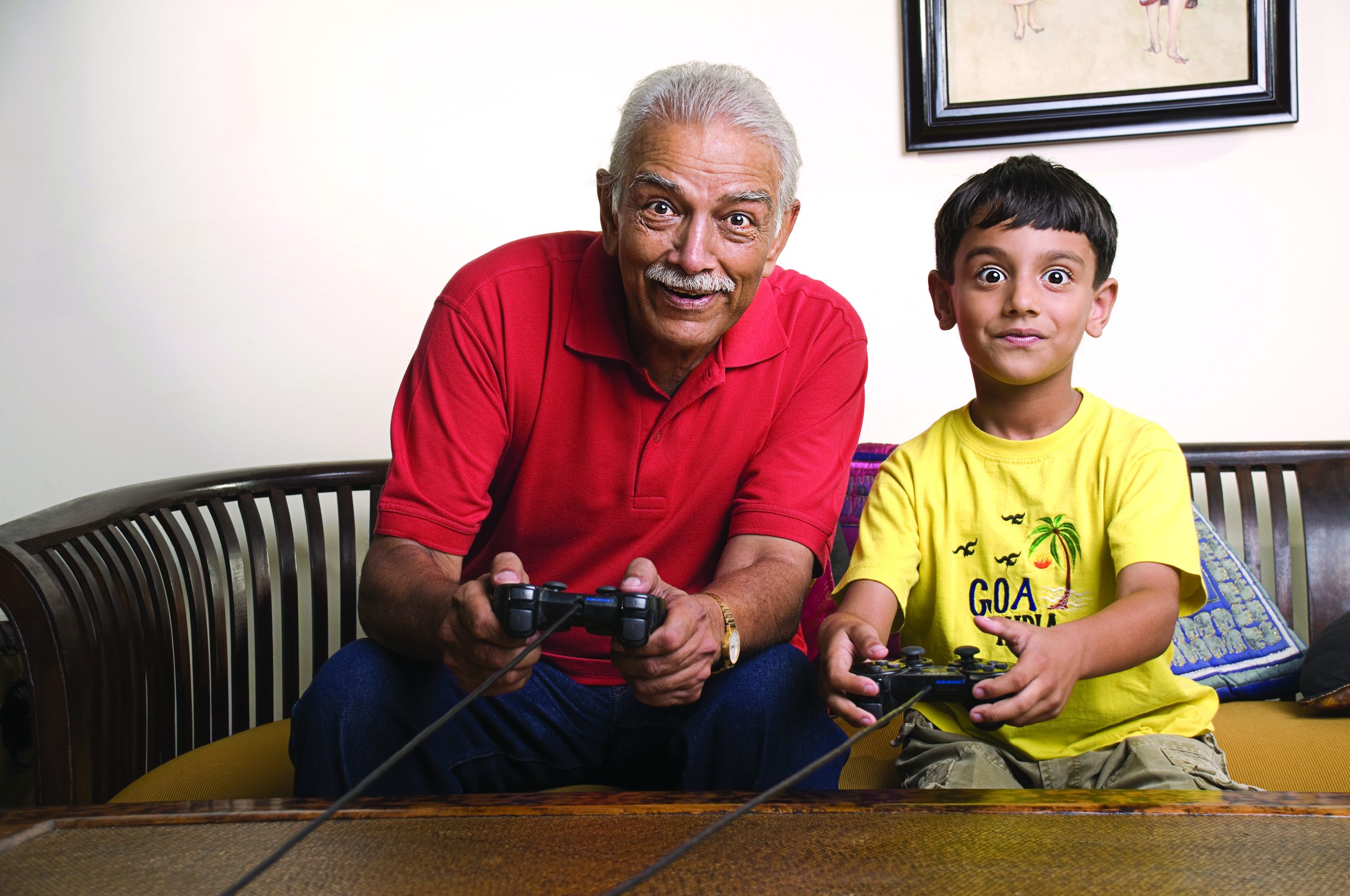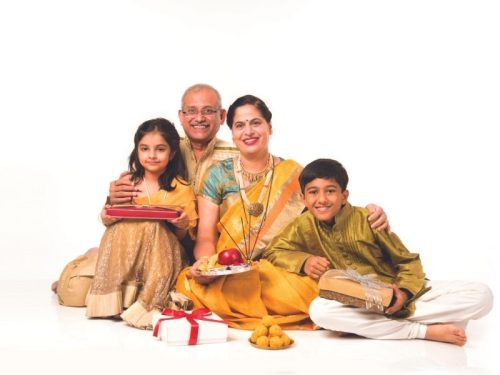Grandparents Big pandemic comeback
During the prolonged Covid pandemic lockdown of India’s education institutions — the longest worldwide — the nurturing and supportive role that grandparents play in developing children into happy and confident adults has come into sharp focus, writes R. Poornima Dilip & Cynthia John
During the on-and-off Covid-19 lockdowns of the past two years, India’s child daycare centres, preschools and schools were shuttered under the most prolonged — and ill-advised — lockdown worldwide. As millions of housemaids and nannies were stuck in their own homes and middle class parents struggled to balance work-from-home with household chores, the country’s silver generation — grandparents past the nation’s too-early retirement age (62-65) — stepped forward to keep home fires burning and help children with online schooling and provide socio-emotional support.
During the long lonely pandemic months, grandparents spent more time than ever before, entertaining, playing with and teaching their grandchildren. Increasingly after being prematurely put out to pasture in the world’s youngest nation (average age: 28), grandparents demonstrated their socio-economic value and earned renewed respect from their children and society.
In sharp contrast with Western mores, until very recently the joint family system was normative in the Indian subcontinent, and arguably in Asia. But during the past half century, Western influence, the emancipation of women and rise of nuclear households diminished the role of grandparents. However, during the prolonged Covid pandemic lockdown of India’s education institutions — the longest worldwide — the nurturing and supportive role that grandparents play in developing children into happy and confident adults has come into sharp focus.
Nor are virtues of India’s traditional joint family being re-discovered only in the subcontinent. Around the world the number of multigenerational households is growing. An estimated 4.5-5 million children live with their grandparents in the US. A study by the Bank of Scotland indicates that 44 percent of households in that dominion relies on grandparents to care for children. In India, an estimated 16 percent of the country’s 260 million households are joint families.
“As parents of a three-year-old, our lives would have been miserable without my parents’ support. During the past two years of the pandemic, they took turns every three months to take care of our son. Without their help we wouldn’t have been able to combine work-from-home and child care. We are grateful for all the risks they took during the pandemic to keep our family happy,” says Shwethashree S, a test engineer in a reputed Bengaluru-based software company.

Rashmi Bajpai, a Delhi-based content writer and blogger, concurs. “During the lockdown, I had to work from home. Writing needs a lot of concentration and peace, and became possible only because my father-in-law took charge of both my children. He supervised their online classes, played games with them and also told them valuable stories rooted in Indian culture and traditions. We are blessed to have him in our lives,” says Bajpai.
Shamantha K, counseling psychologist, Fortis Hospitals, Bengaluru, believes that the unprecedented Covid-19 pandemic which hugely disrupted household routines, has prompted millennials infected with ageism to reassess and learn to appreciate the silver generation. Millions of gr andparents voluntarily stepped forward to lovingly nurture their grandchildren, providing them love, security and benefit of their life experiences. “The long lockdown of schools, creches and offices compelled millennial parents to appreciate the nurturing role grandparents play in developing children into emotionally balanced and confident adults. Millions of senior citizens willingly volunteered to provide unconditional love, support and security when parents were struggling to cope with the new realities of working from home and online schooling. Several studies have shown that the involvement of grandparents increases during crises. Even grandparents living in other states and countries increased their virtual interactions with grandchildren and provided emotional support,” says Shamantha.
andparents voluntarily stepped forward to lovingly nurture their grandchildren, providing them love, security and benefit of their life experiences. “The long lockdown of schools, creches and offices compelled millennial parents to appreciate the nurturing role grandparents play in developing children into emotionally balanced and confident adults. Millions of senior citizens willingly volunteered to provide unconditional love, support and security when parents were struggling to cope with the new realities of working from home and online schooling. Several studies have shown that the involvement of grandparents increases during crises. Even grandparents living in other states and countries increased their virtual interactions with grandchildren and provided emotional support,” says Shamantha.

The critical role that grandparents can play — if they are allowed to play it — in children’s and grandchildren’s lives is also testified by Priyanka Shenoy N, a Mysuru-based research scholar. “As the mother of a four-year-old, it would have been impossible for me to complete my Ph D studies without my parents who cared for my daughter while I was writing my doctoral thesis. I am also an aspiring playback singer. Without my parents’ support, I would have had to sacrifice my career and dreams when I became a mother,” avers Shenoy.
The enabling and life-changing role that grandparents can play in family lives is reinforced by contemporary studies. A recent research study conducted by Prof. Ann Buchanan at Oxford University highlights the important role of grandparents in nurturing grandchildren. According to Prof. Buchanan, who heads this top-ranked university’s faculty of social policy and intervention, grandparental involvement enhances the cognitive and emotional well-being of children. “The study of more than 1,500 children (in the UK) supports the renewed belief that households with high levels of grandparental involvement have fewer emotional and behavioural problems,” says Buchanan.

Unsurprisingly, therefore, during India’s 60-65 week pandemic lockdown of education institutions, active involvement of grandparents provided grandchildren much-needed security and emotional support. “The pandemic lockdowns and socialisation restrictions have played havoc with the emotional well-being of children and adolescents. Social isolation and schooling disruption caused great stress and made children uncertain about the future. In such times of crisis, the presence of grandparents is very reassuring. They provide love, support, and most important, give grandchildren undivided time and attention. All this reduces stress and has a calming influence on vulnerable children,” says Shubhada Shekar, a Bengaluru-based child counsellor and psychologist.
Conversely, grandchildren have a positive influence on grandparents who tend to be forced into premature retirement in a persistently low-growth economy that doesn’t generate sufficient employment. “South Asian grandparents find meaning in life as they invest in childcare, participate in decision-making, and socialisation, and inculcate cultural values in their grandchildren. Feelings and experiences of responsibility and authority… keep South Asian grandparents active and healthy,” write David W. Shwalb and Ziarat Hossain in Grandparents in Cultural Context (2017).
Indeed, renewed affection and bonding with grandparents — even if driven by utilitarian motives — has given a new lease of lives to millions of senior citizens. Studies indicate that the rising incidence of depression among the elderly experiencing loneliness during isolation prior to the outbreak of the Covid pandemic and national lockdown of business, industry and education in March 2020, has been substantially reversed with grandparents spending time with grandchildren and contributing to their cognitive development and socio-emotional growth.
Not that it’s been entirely smooth sailing. The elder generation has its own experiential ideas of child development and nurturance, and differences of opinion over how best to raise the children aren’t infrequent. Child counsellors say the biggest areas of contention are food, discipline, gifts and religious belief. “Grandparents are great for children’s cognitive and socio-emotional development. But on the flip side, they tend to over-indulge children and are often permissive about digital gadgets which they don’t fully understand. This often generates conflict between parents and grandparents. That’s why it’s important for grandparents to consult their grown children to be in sync with modern parenting. Similarly, it’s important for parents to value, respect and appreciate the time, love and nurturance grandparents provide to their grandchildren. Moreover not a few parents tend to be over-demanding and insist on grandparents becoming full-time child care givers. It’s important for young parents to appreciate that grandparents have their own lives and need to pursue their own interests,” says Shamantha K, counseling psychologist, Fortis Hospitals, Bengaluru.
Impactful grandparenting
The US-based Foundation for Grandparenting has listed the following attributes of effective grandparenting.
Being there. A grandparent’s presence is positively correlated with increased emotional security in a grandchild. A 2013 study by Boston College researchers found that a close, emotional relationship between grandparents and grandchildren can have a measurable effect on the psychological well-being of grandparents and grandchildren.
Generosity. This is the most defining characteristic of effective grandparenting. Altruism as a personality trait can explain the biological foundation of grandparents’ nurturing, protective and supportive roles.
Vitality. It’s important for grandparents to be physically active, and display emotional, spiritual, mental and intellectual vitality. And vitality is a two-way street. Grandchildren benefit from their grandparents’ vitality, but are also capable of vitalising grandparents. Grandparents who share deep bonds with grandchildren report that they have more energy and vitality since they began caring for grandchildren.
Persistence. Effective grandparents are creative in overcoming obstacles that prevent them from being with their grandchildren. Long-distance grandparents can maintain a strong attachment to grandchildren by using the phone, mail, or computers to bridge physical distances.
Positive relationships. Grandparents are proactive about getting involved in their families’ lives and strive to be supportive figures for all. According to the World Health Organisation, contemporary grandparents are more likely to be healthy, involved in the daily family regimen, and more economically independent than the previous generation. US-based psychologist M. Silverstein’s research indicates that in Asian societies when grandparents choose not to participate in childcare of young grandchildren, their relationships with their children deteriorate.
Famous people and their grandparents

A young Barack Obama (centre) with grandparents
Famous people and their grandparents. Several successful people have been raised by grandparents including former US President Barack Obama, who fondly remembered his grandmother in his presidential victory speech in 2008. “While she’s no longer with us, I know my grandmother’s watching, along with the family that made me who I am. I miss them tonight. I know that my debt to them is beyond measure,” he said.
Indira Nooyi — the India-born former chief executive of Pepsico Inc, the billion dollar soft beverages and foods company — disclosed in a recent interview that her paternal grandfather, a charismatic judge in India was a major positive influence. She spoke of her struggle to balance family life and her career. “Let’s solve it by bringing the ageing (grandparents), middle-aged kids who are having kids and the little kids all together into a supportive system. That’s the next revolution,” she said in an onstage conversation at Tina Brown’s Women of the World Summit 2016.
Kirthi Jayakumar, founder of the Red Elephant Foundation, a Chennai-based youth-led peacebuilding initiative, credits her grandmother for providing her with a nuanced understanding of feminism. “I initially understood feminism to be anti-men. But grandmother explained that when men show love and care and don’t discriminate on the basis of gender or identity, they need to be appreciated. That day, my grandmother redefined my myopic view of feminism. For me feminism became about making my own choices, right to equality and the right to be empowered to make choices,” she says.
Grandparenting Styles

Grandparents are of various types and personalities. Here are some grandparenting styles for senior citizens to adapt and emulate.
The whacky grandparent. This cool grandparent doesn’t hesitate to do whacky, outlandish things with children, be it bungee-jumping or running the marathon. “My parents join my son, Vinay, in the activities he enjoys, such as swimming and running. They even went ziplining with him. That makes them cool and much loved grandparents,” says Riyanna Chris, a Chennai-based journalist.
Parents need to provide opportunities for children and grandparents to do activities together. For instance, you could sign them up for swimming or dance lessons with the children.
The know-all grandparent. This grandparent knows all about the ‘right’ way, including how to potty-train, feed and treat ear infections of grandchildren. She believes her parenting experience invests her with expertise to proffer a never-ending stream of advice about childrearing.
Respect for aged grandparents should prevent you from pointing out their child management obsolescence mistakes. Remaining silent requires patience and self-control. In such situations, when you disagree with them, invite them to read a well-researched article on the issue in contention. Discuss and reason calmly without creating a battle scene before your child.
Tradition-rich grandparents. If you’re a liberal latter day parent, you might have grandparents who are all set to take on the challenge of educating the children about culture, heritage, traditions and festivities.
“One set of Punjabi grandparents and one from Karnataka, helped my son appreciate the nuances of numerous festivals, cultural traditions and cuisines,” says Sunayna S.P, yoga instructor, Bengaluru. According to her, when she doesn’t want her children to heed certain superstitions or follow out-dated traditions, a private discussion over dinner with the children about different generations with differing and unacceptable beliefs solves the problem.
The ‘alternate’ parent. When parents work long hours or travel a lot, grandparents often become ‘alternate’ parents. In such situations, even if parents and grandparents have conflicting views on childrearing, they have to put up with each other for the child’s sake. Better than lecturing them about modern parenting, present them a good book on contemporary parenting.
Distant grandparent. This genre enjoys play with grandkids but would rather distance themselves from the nitty-gritties of raising children. This is normative when grandparents are separated by distance and rarely meet their grandchildren. Watching an energetic and enthusiastic grandchild is enjoyable for them but they prefer not to get involved in issues like discipline or good habits. They would rather be themselves and let the grandchild enjoy their company and vice versa. To build family bonds, encourage emails, letter-writing, exchange photos and plan short outings together. Parental love apart, your child also needs her grandparents’ affection.
Also Read: Involve grandparents to make happy children
















Add comment